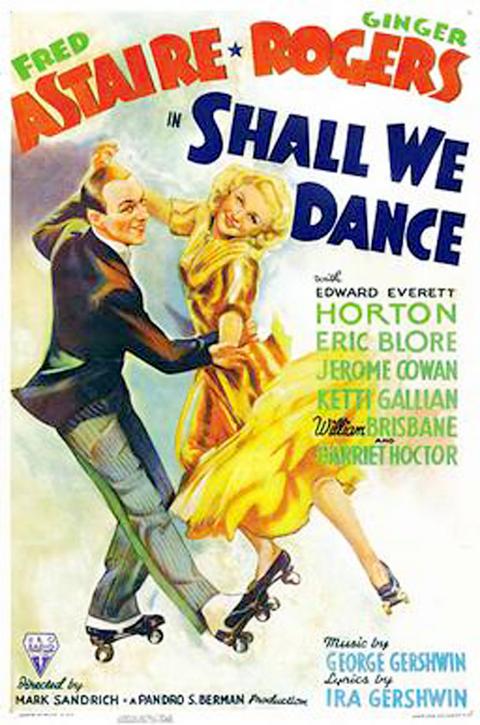The modal verb “will” is used in both American and British English to express either a future aspect (“it will rain this weekend”) or intent (“I will see you later”). An alternative, “shall,” can be used when the subject is either “I” or “we,” as in “I shall see you later”; “it shall rain tomorrow” sounds strange. However, Americans tend to just use “will,” and “shall” has largely fallen into disuse in the US. Even in British English, “shall” is used selectively, for example in more formal situations (“when we obtain sufficient evidence we shall act upon it”) or suggested actions (“Shall we dance?”).
The latter is an example of the usage of “shall” heard in both the US and the UK: it has become a set phrase, popularized both in the song “Shall We Dance” — lyrics by Ira Gershwin — from the 1937 movie of the same name and in the 1951 Rodgers and Hammerstein Broadway musical The King and I by the song Shall We Dance? — lyrics by Richard Rodgers — (“Shall we dance? On a bright cloud of music, shall we fly? Shall we dance? Shall we then say ‘Goodnight’ and mean ‘Goodbye’?”). Gershwin and Rodgers were American.
You couldn’t substitute “will” for “shall” in this phrase: “Will we dance?” is less an invitation and more a question about probability; you would say “let’s dance” instead. “Let’s Dance” was the title of a song, too, by David Bowie. He was British.

(Paul Cooper, Taipei Times)
情態動詞「will」(將),在美式英文和英式英文中都用做表示未來,例如「It will rain this weekend」(這週末會下雨),或表示意向,例如「I will see you later」(我們待會見)。當主詞是「I」(我)或「we」(我們)時,也可用「shall」(應)來代替「will」,例如「I shall see you later」,但「it shall rain tomorrow」聽起來卻怪怪的。然而,美國人傾向只使用「will」,很少用「shall」。即便在英式英文中,「shall」也是選擇性地使用,例如在較正式的情況:「when we obtain sufficient evidence we shall act upon it」(我們取得足夠的證據時,就會依此採取行動),或建議做出行動,例如「Shall we dance?」(我們來跳舞好嗎?)。
「Shall we dance?」是在美國和英國都可聽到的「shall」之用法,這句話已成了固定的說法,因一九三七年電影《Shall We Dance》中的同名曲(由艾拉‧蓋希文作詞),以及一九五一年的百老匯音樂劇《國王與我》(由作曲家羅傑斯與作詞家哈默斯坦所合作)而流行。《國王與我》中的「Shall We Dance?」一曲,是由理查‧羅傑斯作詞(歌詞為:「我們來跳舞好嗎?在音樂明亮的雲霄,我們一起飛翔好嗎?我們來跳舞好嗎?然後我們要說「晚安」,意思是「再見」嗎 ?)。蓋希文和羅傑斯都是美國人。

Photo: Wikimedia Commons
照片:維基共享資源
「Shall we dance?」這句話中的「shall」,不能用「will」代替,變成「Will we dance?」,因為「Will we dance?」是在詢問是否可以跳舞,而非邀請之意。若要邀請人跳舞,可說「Let’s dance」(我們來跳舞)──這也是一首歌的歌名,由大衛‧鮑伊所作,但他是英國人。
(台北時報林俐凱譯)

The 2025 Seoul International Book Fair was held from June 18 to 22 at the COEX Convention & Exhibition Center in Seoul, South Korea. This year, participants from 17 countries attended, with over 530 publishing houses and related organizations taking part. For the first time, Taiwan participated in the book fair as the Guest of Honor, bringing together more than 85 publishers and presenting a curated selection of 550 titles. A delegation of 23 Taiwanese creatives traveled to Seoul to attend the event, including 13 literary authors, six illustrators, and four comic book artists, among which were a film director, an

The new generation born between 2025 and 2039 has been officially named “Generation Beta,” or simply “Gen Beta.” This generation will be the first to experience a world where artificial intelligence (AI) plays a key role in daily life. Generations are defined by shared cultural, social and historical experiences within a specific time frame. These experiences, often influenced by significant events and technological advancements, shape the values, attitudes and behaviors of each generation. The concept of generations helps us understand how different age groups interact with their environment and contribute to societal changes over time. The previous generational transition from Gen

In late 2024, the suicide of acclaimed Taiwanese author Chiung Yao at 86 sparked a societal debate. She expressed her desire to avoid the difficult aging process and sought to govern her own death rather than leave it to fate. Her statements propelled the issue of “euthanasia” back into the public arena, posing the question of whether Taiwan should legalize euthanasia to grant patients and the elderly the right to die with dignity. Euthanasia, the intentional ending of a life to relieve suffering, is legal for humans in countries like the Netherlands and Belgium but remains prohibited in Taiwan.

Continued from yesterday(延續自昨日) https://www.taipeitimes.com/News/lang As Gen Beta grows, they are expected to witness advanced technologies becoming fully integrated into various fields like education, workplaces, healthcare and entertainment. In addition to technological developments, they will also face big challenges like severe climate change. Influenced by their Gen Y or Gen Z parents, who view climate change as a critical issue for the future and prioritize sustainability, they are likely to focus more on global issues and seek innovative solutions to address them. Moreover, Gen Beta will experience considerable demographic changes, such as lower birth rates and longer lifespans. Consequently, Gen Beta is predicted to